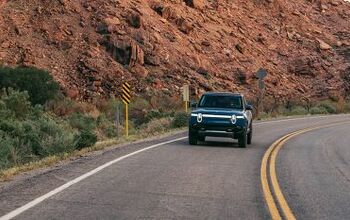Toyota and Suzuki, Scared of Falling Behind, Eye Partnership

This could be the start of a beautiful business partnership.
After its romance with Volkswagen AG ended in a bitter breakup last year, Suzuki is considering hopping into bed with the world’s largest automaker.
Toyota and Suzuki issued a joint press release today announcing their intention to get together and see where it goes.
The two automakers aren’t committing to anything at this point, only stating that both will “start exploring ideas that are directed towards a business partnership.”
Toyota overtook Volkswagen as the world’s largest automaker in September, but even industry leaders recognize their shortcomings. Both automakers cite increasing consolidation in the industry and the limitations of a single company’s R&D operations as the reason for the potential hook-up.
“In addition to efforts to tackle environmental and energy issues, as well as to ensure our customers’ safety and security, we are required to work on the R&D of advanced and future technologies, such as on automated driving,” said Toyota president Akio Toyoda in a release.
The executive admitted Toyota is “not really good” at creating alliances. Still, the automaker needs to “cover its bases” and create the “capability to respond to changes in order to survive,” he said.
While Toyota is strong in R&D, Suzuki knows small cars and emerging markets. In many ways, the potential partnership looks a lot like the Nissan-Mitsubishi alliance announced earlier this year. (In that deal, however, Nissan was Mitsubishi’s financial savior.)
Speaking at a joint press conference, Suzuki chairman Osamu Suzuki said the potential partnership was his company’s idea. A month ago, Suzuki approached Toyoda to talk collaboration.
Suzuki’s automotive operation is rooted in selling cheap minivehicles in Japan and India, which puts the automaker on shaky ground, the chairman says.
“Even in such countries, we have understood that there will be uncertainty in the future if we only continue to just refine our traditional automobile technologies which we have been working on thus far,” Suzuki stated.
Suzuki entered into an ill-fated alliance with Volkswagen in 2009, with the German automaker taking a 19.9-percent stake in its Japanese partner. The Love Boat then sailed directly into the rocks. There were reports of problems with joint projects and acrimony between both companies’ engineers and management, which spelled a quick end to the once-promising alliance. Other accounts, published by TTAC in 2012, place blame for the failed alliance directly at Osamu Suzuki’s feet.
An international arbitration court completed the divorce.
Oddly, the court ruled in Suzuki’s favor one month before Volkswagen’s diesel emissions scandal blew up in its face. Hearty laughs, no doubt, could be heard in Hamamatsu.
[Image: Toyota Motor Corporation]

More by Steph Willems
Latest Car Reviews
Read moreLatest Product Reviews
Read moreRecent Comments
- TheEndlessEnigma Hybrids and PHEVs make sense, EV's do not.
- Ajla My understanding is that the 5 and 7-Series cater almost exclusively to the Chinese market and they sell them here just so they don't look weak against Mercedes and Audi.
- EBFlex Interesting. We are told there is insatiable demand for EVs yet here is another major manufacturer pivoting away from EV manufacturing and going to hybrid. Did these manufacturers finally realize that the government lied to them and that consumers really don’t want EVs?
- Kwik_Shift_Pro4X What's worse than a Malibu?
- MaintenanceCosts The current Malibu is poorly packaged; there's far more room inside a Camry or Accord, even though the exterior footprint is similar. It doesn't have any standout attributes to balance out the poor packaging. I won't miss it. But it is regrettable that none of our US-based carmakers will be selling an ordinary sedan in their home market.


































Comments
Join the conversation
>>"Suzuki entered into an ill-fated alliance with Volkswagen in 2009, with the German automaker taking a 19.9-percent stake in its Japanese partner. The Love Boat then sailed directly into the rocks."
They say partnership, I say takeover. If this "partnership" goes well, Suzuki automobiles won't exist in ten years. They might have Suzuki branded motorcycles, but not cars.